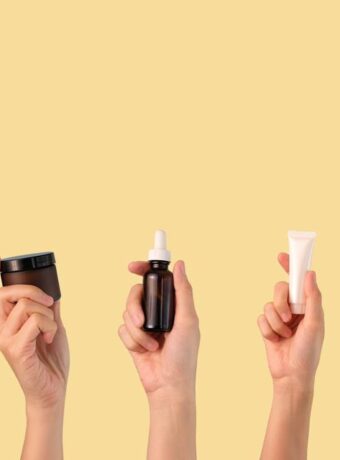Stress is a condition of mental, emotional or psychological tension caused by difficult situations. When a person experiences stress, the body releases stress hormones such as cortisol and adrenaline, which trigger the “fight or flight” response. Chronic stress can have a variety of negative effects on a person’s mental and physical health, thus it can indirectly cause stressed skin.
Stress can have a significant impact on the skin in various ways. Stress hormones such as cortisol can trigger inflammation and cause changes in the skin’s texture and appearance. These affect the flow of blood to your skin and cause many other skin-related issues.
Stressed Skin Side Effects
Stress affects the skin depending upon the fact that how you respond to it. If you already have any skin issues then stress can make your skin condition worse. Here are a few examples of how stress can affect the skin
1. Acne
As we know that stress can increase the production of hormones such as cortisol and androgens, which can lead to an increase in oil production in the skin. This can result in clogged pores, leading to the development of acne. While stress alone may not cause acne, it can certainly contribute to its development and make it more difficult to manage. Practicing stress-reducing activities such as exercise, meditation, and getting enough sleep can help to reduce stressed skin conditions.
2. Wrinkles And Fine Lines
Stress can accelerate the aging process by causing oxidative damage to the skin which can lead to the formation of wrinkles and fine lines.
Stress hormones are released which can break down collagen and elastin, two proteins that help keep our skin firm and elastic. Collagen and elastin are essential for maintaining the skin’s structure and preventing wrinkles and fine lines from forming.
3. Eczema And Psoriasis
Stress can trigger or worsen certain skin conditions, such as eczema and psoriasis. These conditions are characterized by dryness. red, itchy, and inflamed skin.
Stress can trigger an immune response in the body, leading to the release of inflammatory cytokines that can exacerbate eczema symptoms. Stress can also cause the skin to become more sensitive and reactive to environmental irritants, making eczema symptoms worse.
Stress can affect the immune system and trigger an inflammatory response in the body. This can lead to the development or worsening of psoriasis symptoms.
4. Dry Skin
Stress can impair the skin’s natural barrier function, which is responsible for retaining moisture and keeping irritants out. When this barrier is compromised, the skin is more susceptible to dryness and other skin conditions. Stress can also lead to changes in lifestyle habits, such as decreased water intake, poor diet, and lack of sleep, which can contribute to dry skin.
5. Rosacea
Stress can cause blood vessels in the skin to dilate, resulting in redness and flushing. This can be especially problematic for people with rosacea. Rosacea is a chronic skin condition that usually affects the face, causing redness, flushing, and small, red, pus-filled bumps. Other symptoms may include eye irritation, thickening of the skin, and swelling.
6. Hives and Rash
Stress can cause the release of histamine, which can lead to the development of hives and rash. It can cause the blood vessels in the skin to dilate, leading to redness and swelling. Stress weakens the immune system making it prone to such conditions. These are also stressed skin signs which need to be treated.
7. Dark Circles And Puffiness Under Eyes
Stress can lead to poor sleep quality, which can cause fluid retention and blood vessels under the eyes to dilate, resulting in puffiness and dark circles. This can cause the skin to appear thinner and more translucent, making the blood vessels under the eyes more visible and resulting in dark circles. This can cause facial skin stress.
Stress can also cause changes in the body’s circulation, leading to reduced blood flow to the skin and impaired lymphatic drainage. This can cause fluids to accumulate around the eyes, resulting in puffiness and bags.
Furthermore, stress can affect a person’s overall health and well-being, which can indirectly impact the health of their skin. For example, stress can lead to poor sleep, an unhealthy diet, and a lack of exercise, all of which can contribute to premature aging of the skin and other serious skin issues.
Tips To Treat Stressed Skin
It is very important to take care of stressed skin when it is freaked out to improve its condition and make it healthier again. Here are some tips to include in your skincare routine!
- Practice Good Skin Care: A proper skincare routine for stressed skin can help protect and nourish your skin. Use a gentle cleanser and moisturizer, and avoid harsh products that can further irritate your skin. There are several German skincare brands that are known for their high quality and best products for stressed skin such as Nivea, Dr Hauschka, Eucerin and Bioderma. These are the best products for stressed skin.
- Stay Hydrated: Drinking enough water can help keep your skin hydrated, which can improve its appearance and texture. To maintain skin hydration, use moisturizers and other skincare products that help to keep the skin hydrated. Moisturizers work by creating a barrier on the skin that prevents water from evaporating, and also by attracting and retaining moisture in the skin.
- Eat a Healthy Diet: A diet rich in fruits, vegetables, and healthy fats can help provide the nutrients your skin needs to stay healthy and vibrant. Oily and junk foods should be prevented.
- Keep Cell Phones and Hands Away From the Face: As we know that our hands and cell phones are not clean all the time and there may be a lot of germs and dirt on them. So, we should keep them away from our faces to keep our facial skin clean and clear.
- Get Enough Sleep: Lack of sleep can increase stress levels and cause the skin to look tired and dull. You should aim for 7-8 hours of sleep per night to help your skin look great. This is very important to treat stressed skin conditions.
- Practice Stress-reducing Techniques: Regular exercise, meditation, deep breathing, and other stress-reducing techniques can help lower cortisol levels and improve the overall health of your skin.
- Use Soothing Products: Look for skincare products that contain ingredients like aloe vera, chamomile, and oat extract, which can help soothe and calm irritated skin. The best products for stressed skin will depend on your individual skin type and concerns, so it’s always a good idea to consult with a dermatologist or esthetician for personalized recommendations.
- Protect your Skin from the Sun: Exposure to the sun’s UV rays can damage and prematurely age your skin. Wear a broad-spectrum sunscreen with an SPF of 30 or higher every day, even on cloudy days, and limit your time in the sun.
By taking steps to manage your stress levels and care for your skin, you can help improve its appearance and overall health. If you continue to experience skin problems despite these efforts, it’s a good idea to consult a professional healthcare provider for further guidance.




